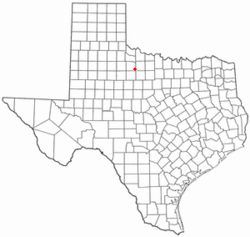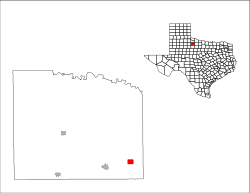Goree, Texas facts for kids
Quick facts for kids
Goree, Texas
|
|
|---|---|

Location of Goree, Texas
|
|
 |
|
| Country | United States |
| State | Texas |
| County | Knox |
| Area | |
| • Total | 1.45 sq mi (3.75 km2) |
| • Land | 1.45 sq mi (3.75 km2) |
| • Water | 0.00 sq mi (0.00 km2) |
| Elevation | 1,453 ft (443 m) |
| Population
(2020)
|
|
| • Total | 158 |
| • Density | 109.0/sq mi (42.13/km2) |
| Time zone | UTC-6 (Central (CST)) |
| • Summer (DST) | UTC-5 (CDT) |
| ZIP code |
76363
|
| Area code(s) | 940 |
| FIPS code | 48-30296 |
| GNIS feature ID | 1358194 |
| Historical population | |||
|---|---|---|---|
| Census | Pop. | %± | |
| 1920 | 614 | — | |
| 1930 | 457 | −25.6% | |
| 1940 | 425 | −7.0% | |
| 1950 | 640 | 50.6% | |
| 1960 | 543 | −15.2% | |
| 1970 | 538 | −0.9% | |
| 1980 | 524 | −2.6% | |
| 1990 | 412 | −21.4% | |
| 2000 | 321 | −22.1% | |
| 2010 | 203 | −36.8% | |
| 2020 | 158 | −22.2% | |
| U.S. Decennial Census | |||
Goree is a small city in Knox County, Texas, in the United States. In 2020, about 158 people lived there. This number was a bit smaller than in 2010, when 203 people lived in Goree.
Contents
Where is Goree?
Goree is located in southeastern Knox County, Texas. It sits where two main roads meet: U.S. Highway 277 and FM 266. It is about 84 miles north of Abilene.
The city covers an area of about 1.5 square miles (3.75 square kilometers). All of this area is land.
A Look at Goree's History
Early Days and Naming
People first started settling in the Goree area around 1886. By 1887, a small community grew around a store and post office. These were built by a person named Bill Benedict.
The community was first called Riley Springs. Later, it was renamed Goree. This new name honored Robert D. Goree, a veteran from the Civil War and an early settler in Knox County.
Moving and Growing
In 1890, J.W. McLendon bought Benedict's store. He moved it and the post office to a new spot. This new place became known as North Goree. A school was built near this relocated store in 1901. In 1904, North Goree changed its name again to Hefner.
The Railroad Arrives
The current location of Goree began to develop in 1905. This was because the Wichita Valley Railroad announced it would build tracks through the area. The year 1906 was very important for Goree. The railroad arrived, and many homes and businesses were built. The community also officially became a city.
The school from Hefner also moved to Goree in 1906. It was then renamed Chigger Hill School.
Population Changes Over Time
In 1920, Goree had 614 residents. By 1940, this number had dropped to 425. The population grew again to 640 people in 1950. However, it slowly decreased throughout the rest of the 1900s.
Who Lives in Goree?
2020 Census Information
The 2020 United States census counted the people living in Goree. A census is like a big survey that counts everyone in a country. It helps us understand how many people live in different places and what groups they belong to.
Here's a look at the different groups of people living in Goree in 2020:
| Group | Number of People | Percentage of Total |
|---|---|---|
| White (NH) | 85 | 53.8% |
| Black or African American (NH) | 9 | 5.7% |
| Asian (NH) | 1 | 0.63% |
| Some Other Race (NH) | 2 | 1.27% |
| Mixed/Multi-Racial (NH) | 6 | 3.8% |
| Hispanic or Latino | 55 | 34.81% |
| Total | 158 |
In 2020, there were 158 people living in Goree. These people lived in 103 households, and 83 of these were families.
Education in Goree
Public schools in Goree are run by the Munday Consolidated Independent School District. Before July 1, 2003, Goree had its own school district called the Goree Independent School District. It then joined with Munday Independent School District to form the Munday CISD.
The school building in Goree was used as Munday Junior High until about 2009. It taught students in seventh and eighth grades. Today, the building is called the Knox Prairie event center. It hosts the Knox Prairie Quilt Show every February.
Bobby Boatright Memorial Music Camp
Goree is home to the yearly Bobby Boatright Memorial Music Camp. This event is for people of all ages who want to learn or improve their Western Swing music skills. Western Swing is a fun style of country music that mixes jazz and blues.
The camp is named after Bobby Boatright, a Western Swing musician. He was the main fiddle teacher at the camp until he passed away in 2008. The camp was even featured in a story on National Public Radio's Morning Edition program in 2010.
See also
 In Spanish: Goree (Texas) para niños
In Spanish: Goree (Texas) para niños

